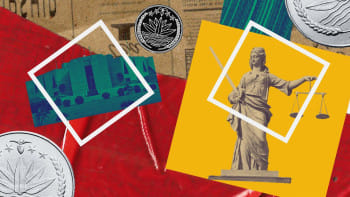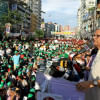BNP must control errant party activists

The fall of Awami League on August 5 following a mass uprising marked a historic shift in Bangladesh's political landscape, but it has also exposed deep cracks within the BNP, as long-suppressed party leaders, activists, and supporters scrambled to fill the void left by their rivals. Over the last month and a half, we have had various reports on the disruptive effects of this transformation. Turf wars, factional infighting, extortion business, and political capture of public sector by BNP-affiliated groups have made frequent headlines, despite stern warnings and occasional disciplinary measures by party high-ups. This is not only hurting its credibility—it also risks derailing the broader vision of reform that drove the uprising.
Since August 5, according a report by this daily, at least 14 BNP members have lost their lives, eight of them linked to factional clashes. The latest incident occurred on Friday, in Chattogram's Changaon area, where a Jatiyatabadi Jubo Dal activist was stabbed to death during a clash between rival factions. The same day, there were heavy clashes between two BNP-linked groups in Chandpur, leading to the injuries of at least 30. Earlier today, a clash between two BNP factions in Narayanganj left 10 injured. Such events have become quite regular, often centring around the control of extortion rackets in various sectors. These violent power struggles mirror what plagued Awami League while it was in power, with over 150 of its leaders and activists killed mostly in internal feuds since its 2018 election win.
The question is, why can't BNP control its activists? And how sincere is it in this endeavour, really? True, the party has recently expelled several local leaders for engaging in such violent and often illegal power exercises. BNP Secretary General Mirza Fakhrul Islam Alamgir's statement that repeating the mistakes of Awami League may bring the same fate for BNP suggests an awareness of the changing reality. But official actions have not been convincing enough for the grassroots leaders and activists, especially because of their confidence about returning to power when the next election is held. This is nothing but opportunism, fuelled by a sense of impunity that the party has failed to dismantle.
Historically, politics in Bangladesh has been held hostage by the patronage system that defined the interaction between parties and their grassroots enablers. While this has richly rewarded some parties, it has brought nothing but misery for citizens. For BNP to really stop its errant members and to credibly support the present campaign of reforms, it must first demonstrate its ability to reform itself. The changes it envisions for the state must start within its own rank and file. The creation of a democratic, transparent and accountable party structure—with zero tolerance for indiscipline, infighting, crimes, or any illegal capture of public institutions—will only enhance its standing as a party committed to genuine reform, not just power.


 For all latest news, follow The Daily Star's Google News channel.
For all latest news, follow The Daily Star's Google News channel. 










Comments